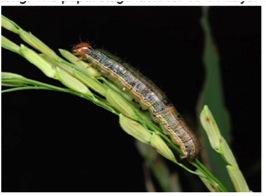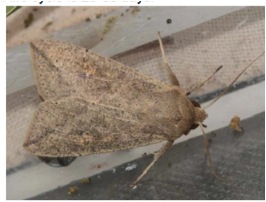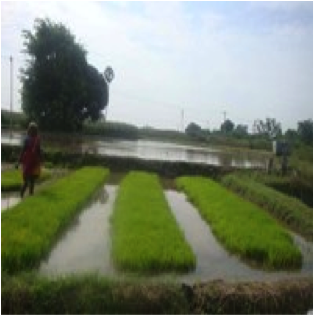Symptom of damage:
- Larvae cut the seedlings in large scale
- Cattle grazed appearance in severely infested fields
- They feed gregariously and march from field to field
Identification of insect pest:
-
Egg: eggs are spherical and creamy in colour, which are laid in a group covered over with grey hairs
-
Larva: caterpillars are light green with yellowish white lateral and dorsal stripes in the early stages and later become dark brown or grayish green in colour with a crescent shaped black spot on the side of each segment
-
Pupa: pupates in an earthen cocoon in soil. Pupa is dark brown and measures 16-17 mm long.
-
Adult: moth is medium sized, stout built dark brown with a conspicuous triangular black spot on the forewings. Hind wings are brownish white with thin black margins.
Management:
-
Flood the nursery to expose the hiding larvae to the surface for birds to pick them up.
-
Allow ducks into the field to feed on the larvae.
-
Larvae perish in heavy rains, and are victims of various diseases, parasitism and predation.
-
Dig trenches around the infested field and place ashes in the trenches to make it difficult for the larvae to escape.
-
Insecticides should be the last resort for armyworm control. In nursery, drain the water and spray chlorpyriphos 20 EC @ 80ml + 20 lit of water for 8 cents.
-
In main field, spary Chlorpyriphos 20% EC @ 500 ml/ac during late evening in case of severe infestation.
|
 |
 |
| Larva |
Adult |
 |
 |
| Infested seedlings |
Flooding Nursery |
|




